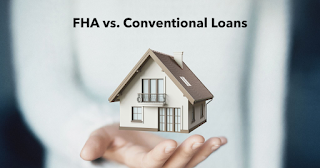FHA (Federal Housing Administration) and conventional mortgage loans are two popular options for financing a home purchase, each with its own set of pros and cons. Here's a comparison to help you decide which might be right for you:
1. FHA Loans:
a.Low Down Payment: One of the most significant advantages of FHA loans is the low down payment requirement. Borrowers can often qualify with a down payment as low as 3.5% of the purchase price.
b.Lower Credit Score Requirements: FHA loans are more lenient when it comes to credit score requirements. Borrowers with lower credit scores may still qualify for an FHA loan.
c.Government-backed: FHA loans are insured by the Federal Housing Administration, which reduces the risk for lenders and allows them to offer more favorable terms to borrowers.
d.Fixed Rates and Adjustable Rates: FHA loans are available with both fixed and adjustable interes
2. Conventional Loans:
a.Higher Down Payment: Conventional loans typically require a higher down payment compared to FHA loans. The exact amount varies but can range from 5% to 20% or more.
b.Strict Credit Requirements: Conventional loans usually have stricter credit score requirements compared to FHA loans. Borrowers typically need a higher credit score to qualify.
c.Private Mortgage Insurance (PMI): If you make a down payment of less than 20% on a conventional loan, you will likely be required to pay for private mortgage insurance (PMI) until you reach a certain level of equity in the home.
d.Flexibility: Conventional loans offer more flexibility in terms of loan terms and options. Borrowers can choose from various fixed-rate and adjustable-rate options.
3. Choose an FHA loan if:
a. You have a lower credit score.
b. You have limited funds for a down payment.
c. You prefer a fixed-rate mortgage with a low down payment.
4. Choose a conventional loan if:
a. You have a higher credit score.
b. You can afford a higher down payment.
c. You want to avoid paying for mortgage insurance (by making a down payment of at least 20%).
d. You prefer more flexibility in terms of loan options.

0 Comments